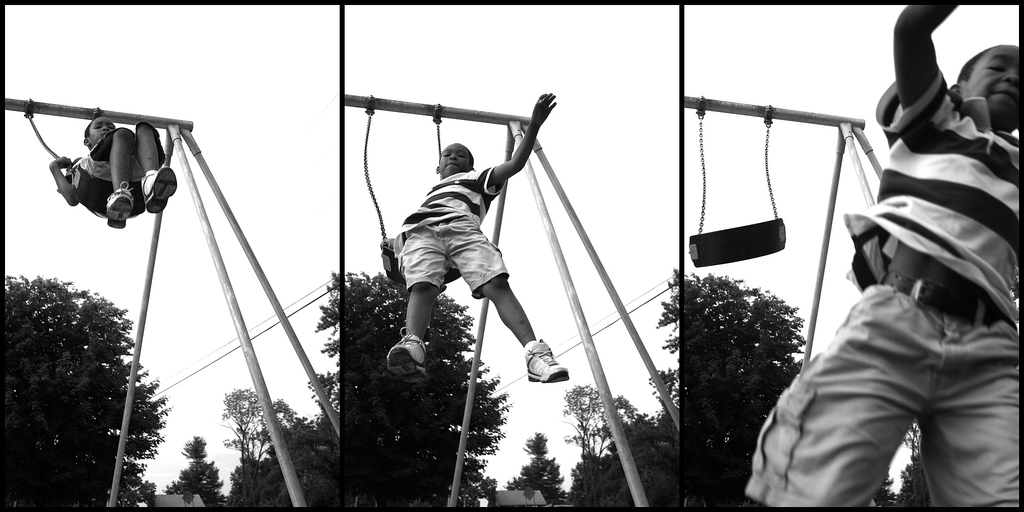Last time we talked about how lying was an important developmental sign for children. (If you missed Part 1 about lying and brain development you can read it here.) While it’s reassuring to know that lying is a part of development, you may still be left with the question:
If my child lies, what can I do about it?
This week, in Part 2, we’ll address how to handle:
- Children telling “tall tales”
- Kids lying to avoid getting in trouble
- Kids agreeing to something but then not doing it
I could write a lot more on this topic and different “what if’s”, but hopefully these 3 examples give you some ideas of possible solutions. The solutions shared here are not intended to cover every possible situation.
Sometimes children lie by telling made up stories
One child we had in our classroom (whose dad was a designer in real life) told the kids that his dad was an astronaut…. and a farmer… and he rode a motorcycle and had a little mini-motorcycle for his son! I believe this 4 year old made up stories to feel good about himself and to connect socially with others.
As his parent or teacher what do you do?
You might go along with these far-fetched tall tales… but maybe only to an extent.
If a child is telling a story to feel good and connect with others then honor those reasons. You want to preserve the child’s pride, you don’t want to embarrass or shame him, especially in front of his friends, but you also might want him to privately know that you are “in on the joke”. This can be a bit of a balancing act.
Here’s one possible way to address it:
Child: My dad’s an astronaut.
Adult: Really, wow! Where did he go?
Child: To Mars.
Adult: Cool. Did he see Martians there?
Child: Yup.
Adult: Whoa! Did they talk to him?
Child: Yes!
Adult: Did he travel a million bagillion miles per hour?
Child: Yup.
Adult: Wow, that’s cool!
By asking questions you are engaging and honoring the fantasy of the child. This playfully questioning can also signals to the child that you know the truth… “wink, wink, nudge, nudge”
If a child is telling other kids things that are not true, you can ask questions to help her discover the truth for herself.
When our daughter was 4 years old, came home from school and said, “Sally has a horse in her backyard.”
I asked her some questions about it…
Adult: Oh! She has a horse. Have you seen it?
Child: No.
Adult: How big is her backyard?
Child: It’s pretty little.
Adult: Do you think it’s big enough for a horse?
Child: Yup.
Adult: Where does she ride it?
Child: Hmmm… maybe around the neighborhood?
Adult: Have you ever seen someone ride a horse on the sidewalk?
Child: No…
It might not happen overnight, but eventually kids will come to their own conclusions, just as our daughter did. And it’s a great way for them to develop their own critical thinking skills.
Sometimes children lie to avoid getting in trouble
A very young child will tell the truth.
Adult: Did you hit your sister on the head with the bucket?
Young Child: Yes!
Even if you don’t use punishments and rewards in your house older kids might not want to get “in trouble”.
Adult: “Did you hide your sister’s [really important thing that she needs for school tomorrow]?”
Child: Nope.
If a child is lying to protect himself. Then reassure him that he’s not going to get in trouble. You are their to support him and be on his team, even if he’s made a poor choice.
Here’s a possibility:
Adult: I’m pretty stuck here. Jill has looked everywhere for her homework and we can’t find it anywhere. She’s really worried about it because she needs it for school. You’re not going to get in trouble. Can you tell me if you hid it?
At this point, many children will tell you the truth.
OR you can also try a more playful option:
Adult: I’m pretty stuck here. Jill has looked everywhere for her homework and we can’t find it anywhere. If you were trying to find some homework, where would you look for it?
If the child did hide the homework, it’s still important to have a follow-up conversation after the situation has “cooled down”. You still explain to them the impact that their actions had on other people, and talk about why they did it.
Adult: Thanks for helping us find Jill’s homework today. I’m guessing that you had a good reason for hiding it….
Child: Yeah, she was so mean to me today she wouldn’t let me play with her doll.
Adult: Oh! Sounds like you were pretty mad and disappointed?
Child: Yeah. I really wanted to play with the doll and she said, “No!”
Adult: Oh! And you wanted to do something back to her?
Child: Yeah.
Adult: Ah! That makes sense. And I also know that you care about her a lot. It’s important for her to know that she can trust you, especially if you want to borrow her doll in the future.
Child: Yup… (sadly)
Adult: You saw how worried and confused she got when she couldn’t find her work. She looked everywhere for it and so did I. We spent a lot of time trying to find it. I’m guessing she’s still pretty upset about it.
Child: Yup… (sadly)
Adult: So what do you want to do now? Do you have any ideas about how you can reconnect with her?
Child: I can draw her a picture to tell her I’m sorry that I hid her homework.
Adult: Sounds good! And if you are having a hard time getting along you can come and get me for help. I’ll help you work things out with her then you won’t need to hide her stuff anymore.
Child: Okay.
Sometimes kids lie when they agree to do something, but then they don’t do it.
Child: Mom, I promise I’ll turn off the computer after I finish this video.
If a child isn’t keeping an agreement that they’ve made, chances are that the agreement was rushed (the child said “yes” just to pacify the parent, because the conversation was too long or laborious) OR maybe it wasn’t a lie at all and they just forgot what they agreed to OR the agreement wasn’t realistic in the first place.
In the moment, if a child isn’t holding to an agreement, you’ll have to make a judgement call… Do you set a limit or do you renegotiate?
Here are some quick examples to give an idea of how you might work things out…
In the moment, you might set a limit
Adult: You said that you’d turn off the computer at 8. Now it’s 8:15 and you’re still on.
Child: I just want to watch one more video.
Adult: That would be fun to watch more videos. I’m not willing for you to watch any more because you have an early start with school tomorrow. Please turn off the computer.
Child: No!
Adult: I know it’s hard. You’re having fun and feeling sad that the fun is over. I’m going to turn off the computer now….
In the moment, you might renegotiate
Adult: You said that you’d turn off the computer at 8. Now it’s 8:15 and you’re still on.
Child: I just want to watch one more video.
Adult: I see how much fun you are having. It’s summer time, so I’m willing for you to watch one more video. Can you promise me that you will turn off the computer this time? Okay, let’s do a pinkie promise!
Come up with a new solution before the next time
When a child breaks an agreement, you might set a limit or renegotiate, but the most important thing is to come up with a new solution for that situation before the next time.
Child: Can I watch videos until 8 tonight?
Adult: I want to say ‘yes’ to that, but I remember last time it was really hard to turn the computer off at 8? What can we do so it’s not so hard this time? What ideas do you have?
In the end, what matters is that we connect and understand our kids and we support the full range of their feelings
Hopefully these examples offer a few ideas for how to handle kids lying. Ultimately, as parents and teachers, if we:
- Understand that lying is an important developmental step
- Know the reason why a child is saying something untrue–whether it’s to connect with friends, avoid getting into trouble, or get the conversation over with–then we can…
- Respond with gentleness, support the child and their emotions, setting limits if needed, and be on the same team to solve the problem together










Love this and sharing!
Thanks, Liliana!
you rock!
You rock too, Lateefah!
This worked like a charm when Liam was young. Now that he’s a teenager, I’m having a harder time. Some of it is my limited patience (c’mon, you’re old enough to put a freakin’ dish in the dishwasher without being told), part of it is that I feel like I’m failing at preparing him for the world (I shudder to think of what his dorm room is going to look like!), but part of it seems like it’s a developmental stage that a teenager has to go through. Independence? Separation from us? I’m not sure … but I am sure that I am starting to feel like a warden and our time spent together is more and more about what he said he’d do but rarely does. Strangely, his daily chores (empty the dishwasher, clean the catbox, make his bed, etc) get done. But brushing his teeth? It takes an hour to get him to do it … and I still go feel his toothbrush and find it dry about half the time. Anyway, I appreciate the scripts and need to try some of the patient interactions we had when we were still at MBNS. :-) Julie
Glad I’m not the only one checking to see if my teenage son’s toothbrush is wet or not!
Haha! Us parents have a lot in common!
I miss those preschool days too! And yes, those patient interactions that we learned when our kids were young still help! I continue to work hard on seeing my kids’ perspective and really understanding it, and telling them about my perspective too. Thankfully teens understand perspective WAY better than 3 year olds do! At least that is a bonus!
First of All, i would thank you for this useful sharing, i would just add to those examples that sometimes we need to understand what is lying behind the wrong behavior such as lies or any other behaviors..once done we can connect from that point and let the child decide by himself if its still needed to lie ..end then we can observe the progress..
I think it’s all very nice, and yet this type of talk just makes kids think that they will always be able to renegotiate limits and not keep to agreements, There is a place for some of it, but for the most part if a kid makes an agreement, they should stick to it and be held accountable.
We may share the same philosophy. What we teach is that limits are for non-negotiable issues (e.g. child needs to wear a seat belt in the car) while agreements are something that the child and adult have agreed to do (e.g. child agrees to do the dishes). If the child doesn’t stick to an agreement, for example with the dishes, then we encourage parents (as long as the agreement was age appropriate, and understood) to have a conversation to work things out, in this way the child is still responsible for helping create the solution that works for everyone, he recognizes his impact on others, and yet there is still some flexibility. Ultimately the child and the parent both feel understood and all their needs get met.